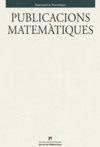广义线性Weingarten超曲面在欧氏空间中的稳定性
IF 1
3区 数学
Q2 MATHEMATICS
引用次数: 1
摘要
给定一个定义在单位欧几里德球上且满足适当凸性条件的正函数F,我们考虑对于浸没在欧几里德空间Rn+1中的超曲面Mn,具有所谓的第k个各向异性平均曲率HF k, 0≤k≤n。对于固定的0≤r≤s≤n,当Rn+1的超曲面Mn的第k个各向异性平均曲率HF k, r≤k≤s线性相关时,称其为(r, s, F)-线性Weingarten。在这种情况下,我们建立了关于浸入Rn+1中的封闭(r, s, F)-线性Weingarten超曲面的稳定性概念,然后,我们证明了这样的超曲面是稳定的,当且仅当,就平移和同理而言,它是F的Wulff形状。对于r = s和F≡1,我们的结果相当于标准稳定性研究,例如,由Alencar-do Carmo-Rosenberg。本文章由计算机程序翻译,如有差异,请以英文原文为准。
Stability of generalized linear Weingarten hypersurfaces immersed in the Euclidean space
Given a positive function F defined on the unit Euclidean sphere and satisfying a suitable convexity condition, we consider, for hypersurfaces Mn immersed in the Euclidean space Rn+1, the so-called k-th anisotropic mean curvatures HF k, 0 ≤ k ≤ n. For fixed 0 ≤ r ≤ s ≤ n, a hypersurface Mn of Rn+1 is said to be (r, s, F)-linear Weingarten when its k-th anisotropic mean curvatures HF k, r ≤ k ≤ s, are linearly related. In this setting, we establish the concept of stability concerning closed (r, s, F)-linear Weingarten hypersurfaces immersed in Rn+1 and, afterwards, we prove that such a hypersurface is stable if, and only if, up to translations and homotheties, it is the Wulff shape of F. For r = s and F ≡ 1, our results amount to the standard stability studied, for instance, by Alencar–do Carmo–Rosenberg.
求助全文
通过发布文献求助,成功后即可免费获取论文全文。
去求助
来源期刊
CiteScore
1.60
自引率
0.00%
发文量
29
审稿时长
>12 weeks
期刊介绍:
Publicacions Matemàtiques is a research mathematical journal published by the Department of Mathematics of the Universitat Autònoma de Barcelona since 1976 (before 1988 named Publicacions de la Secció de Matemàtiques, ISSN: 0210-2978 print, 2014-4369 online). Two issues, constituting a single volume, are published each year. The journal has a large circulation being received by more than two hundred libraries all over the world. It is indexed by Mathematical Reviews, Zentralblatt Math., Science Citation Index, SciSearch®, ISI Alerting Services, COMPUMATH Citation Index®, and it participates in the Euclid Project and JSTOR. Free access is provided to all published papers through the web page.
Publicacions Matemàtiques is a non-profit university journal which gives special attention to the authors during the whole editorial process. In 2019, the average time between the reception of a paper and its publication was twenty-two months, and the average time between the acceptance of a paper and its publication was fifteen months. The journal keeps on receiving a large number of submissions, so the authors should be warned that currently only articles with excellent reports can be accepted.

 求助内容:
求助内容: 应助结果提醒方式:
应助结果提醒方式:


